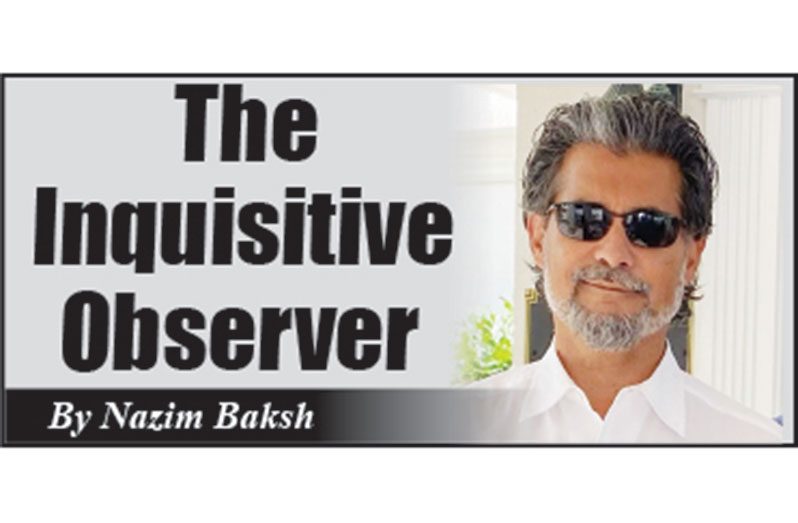GIVEN the number of times Aubrey Norton has reached for the word “dunce” to describe President Dr. Mohamed Irfaan Ali, one might assume he believes himself the embodiment of intellect. The term itself originated from the name of John Duns Scotus, a medieval scholar of formidable influence. His followers, later mocked as “Duns men” or “dunces,” were accused of opposing learning and progress, a poor fit for a leader who is visibly guilty of neither ignorance nor backwardness.
Norton, for the record, earned a master’s degree in International Relations from the University of Kent in 1994. But beyond that, his academic footprint fades into obscurity—there is no public trace of his thesis or any substantive scholarly contributions. His leadership résumé, if you can call it that, inside or outside government, is equally thin.
His passport, from all appearances, bears stamps from Cuba, the United Kingdom, and Nigeria, but little else. For a man seeking to lead a diverse, global-facing nation, his limited exposure stands in sharp contrast to his ambitions. It’s little wonder that many prominent figures within his own People’s National Congress (PNC) have publicly judged him unfit to lead the party, let alone the nation.
By comparison, Dr. Ali is a giant—not because his party says so, but because the world has said so. In 2024, the University of California, Berkeley, awarded him the Global Leadership Award for Open Innovation. That distinction places him in the company of former President of the United States, Barack Obama, former U.S. Treasury Secretary Janet Yellen, and Pranab Mukherjee, the former President of India. Such a company is not kept by accident.
Speaking of India, in 2023, its government conferred upon Dr. Ali the Pravasi Bharatiya Samman—India’s highest honour for overseas Indians. The award recognised his exceptional achievements in politics and community service. Barbados, that same year, granted him its Order of Freedom. Presenting the award was none other than Prime Minister Mia Mottley, who praised Dr Ali’s efforts in driving regional integration, economic partnership, and especially his leadership on food and nutrition security.
Speaking of food and nutrition security, just three years into the office of the presidency, the Inter-American Institute for Cooperation on Agriculture (IICA) conferred on him an award in San Jose, Costa Rica, in recognition of his efforts to reduce food imports within CARICOM and position Guyana as a global leader in food production.
And it wasn’t IICA alone, President Ali was awarded the Caribbean Global Leader Award in 2024 and that same year, the Legacy Award from the American Foundation for the University of the West Indies, for nation-building and regional cooperation.
It is next to impossible for a young leader from a humble village in Guyana to fool a selection panel at Berkeley, the Government of India, the Government of Barbados, the Inter-American Institute for Cooperation on Agriculture, the William J. Perry Center for Hemispheric Defense Studies and the Woodrow Wilson Center in Washington, D.C., all in succession. And yet, according to the logic of Norton, Ganesh Mahipaul, and Juretha Fernandes, the UN Secretary-General António Guterres must be equally “wrong” for hailing President Ali’s leadership on climate policy.
The absurdity deepens. Are we to believe that climate experts from Yale, Harvard, and Oxford—who have publicly described Ali as “visionary”—have all been duped? Or that former Colombian President Iván Duque misread him when he said:
“When I met the President, I understood that he not only represented a new generation of leadership for this country, but a person whose personal commitment is to put Guyana in the eyes of the whole planet… He is a model for sustainable, inclusive development.”
In Accra, Ghana, African civil society leaders and the then Prime Minister of Mozambique, Adriano Maleiane, praised Ali’s “unwavering dedication to promoting inclusive development” and “firm dedication to the prosperity and well-being of all Guyanese.” Those sentiments were echoed when he received the Global Africa Leadership Award in 2024—recognising his approach as “transformational” and a model for “unity, prosperity, and shared progress.”
And that’s not even the full roll call of recognition. But when Norton and other PNC speakers get up on their high horses to castigate the man who has led the nation from the bankrupt policies of APNU minus AFC now, they are indulging, once again, not surprisingly, in race-baiting.
In just a few short years, President Ali has shifted Guyana’s image from the periphery of the map to the centre of global discussions on a range of pressing issues, including climate, food security, and sustainable development. He has turned the country into a destination for cooperation, investment, and respect. And I haven’t even touched on his vision to transform Guyana into an eco-tourism hub.
Two days ago, he commissioned an extended runway at Kaieteur Falls, built by the Guyana Defence Force (GDF), the first step in showcasing one of the “wonders of the world” to domestic and foreign visitors alike. By contrast, Norton’s political vocabulary remains limited to personal insults. In doing so, he has unwittingly confirmed the adage: when you have no achievements to point to, you point fingers.
DISCLAIMER: The views and opinions expressed in this column are solely those of the author and do not necessarily reflect the official policy or position of the Guyana National Newspapers Limited.
Irfaan Ali’s record speaks louder than Norton’s insults
SHARE THIS ARTICLE :
Facebook
Twitter
WhatsApp



.jpg)








